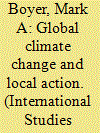|
|
|
Sort Order |
|
|
|
Items / Page
|
|
|
|
|
|
|
| Srl | Item |
| 1 |
ID:
119410


|
|
|
|
|
| Publication |
2013.
|
| Summary/Abstract |
Climate change is the signature global issue of our time. This is not just because of climate change itself, but also because of the host of socioeconomic and physical impacts that will result from rising temperatures globally. But fundamentally for scholars of international relations, climate change confronts the policy limitations of sovereignty and its implications for global action directly. Because of the lack of effective global and even national climate change policy action, policy initiatives to confront climate change must focus on levels below the global, even though economic models suggest that global policy provision might be the most efficient way to target the implications of climate change. Thus, this study centers on the complexity of climate change policymaking by focusing attention on the evolution of climate change policy action in the New England region, the State of Connecticut, and its municipalities.
|
|
|
|
|
|
|
|
|
|
|
|
|
|
|
|
| 2 |
ID:
119408


|
|
|
|
|
| Publication |
2013.
|
| Summary/Abstract |
Both political activism by pop musicians and the discussion of popular culture in international relations (IR) have been on the rise in recent years. A closer look at the political meaning of mainstream pop songs, however, is still missing. Therefore, we examine the political worldviews that become manifest in the lyrics of US and German top ten hits from 1960 to 2009. A remarkable feature of these worldviews is the rejection of political institutions and actors in a mood of alienation and disenchantment, along with a strong appeal to the responsibility of individuals to autonomously tackle societal deficiencies. This appeal is based on a pronounced trust in people's capacity to solve problems jointly and without any interference by institutionalized politics. In this context, the growing recognition of political activism by so-called celebrity diplomats may be linked to these worldviews. Reflections on normative implications of the political worldviews, in turn, raise delicate questions about legitimate agency and the way public affairs are organized.
|
|
|
|
|
|
|
|
|
|
|
|
|
|
|
|
| 3 |
ID:
119409


|
|
|
|
|
| Publication |
2013.
|
| Summary/Abstract |
This article examines the impact of sociopolitical and spiritual factors on Asians' perceptions of US and China's influence. From the 2003 AsiaBarometer survey, seven Asian countries with diverse socioeconomic and religious components are analyzed-India, Japan, Malaysia, South Korea, Sri Lanka, Thailand, and Uzbekistan. Multilevel estimates reveal that (i) individuals from the seven nations show fewer similarities than do members of different religious institutions concerning US and China's influence in the region; (ii) only Muslims strongly oppose US influence in the region, while other religious affiliations do not wield any significant explanatory power. Contrastingly, individuals affiliated with religions positively perceive China's influence; (iii) sociopolitical contentment substantially boosts favorable perception about the United States and China; and (iv) spiritual perseverance discourages approval of the United States and China, but not trust in religious organizations.
|
|
|
|
|
|
|
|
|
|
|
|
|
|
|
|
| 4 |
ID:
119407


|
|
|
|
|
| Publication |
2013.
|
| Summary/Abstract |
Much has been written in the last decade on using film as a pedagogical tool in the classroom and specifically in the teaching and learning of international relations (IR). Instructors assert that film has numerous beneficial effects in terms of student interest, engagement, conceptual understanding, and class performance. This article builds upon the existing literature and fills a gap by presenting and analyzing the empirical findings of recent classroom research on the usefulness of five films for student engagement, understanding, and interpretation of various IR topics (IR theory, media and war, and human rights). The data and their analysis reveal that film can potentially be a powerful and dramatic medium to aid student learning of IR, but the results are mixed. Students' written work also demonstrates that film's value can be overrated and that film can be superficial and confusing. This research sheds light on how we can better use film in the international studies classroom beyond its entertainment and illustrative value.
|
|
|
|
|
|
|
|
|
|
|
|
|
|
|
|
| 5 |
ID:
119406


|
|
|
|
|
| Publication |
2013.
|
| Summary/Abstract |
Interest in zombies is booming across campuses. International Relations (IR) scholars have likewise begun to pay attention to the undead, as the zombie invasion scenario-envisioned in a variety of movies, television shows, and books-brings to bear many of the key issues and controversies of international relations theory. Here I provide some concrete suggestions for incorporating zombies into undergraduate classes. Drawing from a leading book in this genre (World War Z), I sketch out some of the ways that the zombie wars can be applied to key issues taught in introductory-level IR classes. I then provide specific suggestions to incorporating these insights into the classroom, including discussion guides and simple role-playing exercises.
|
|
|
|
|
|
|
|
|
|
|
|
|
|
|
|
|
|
|
|
|